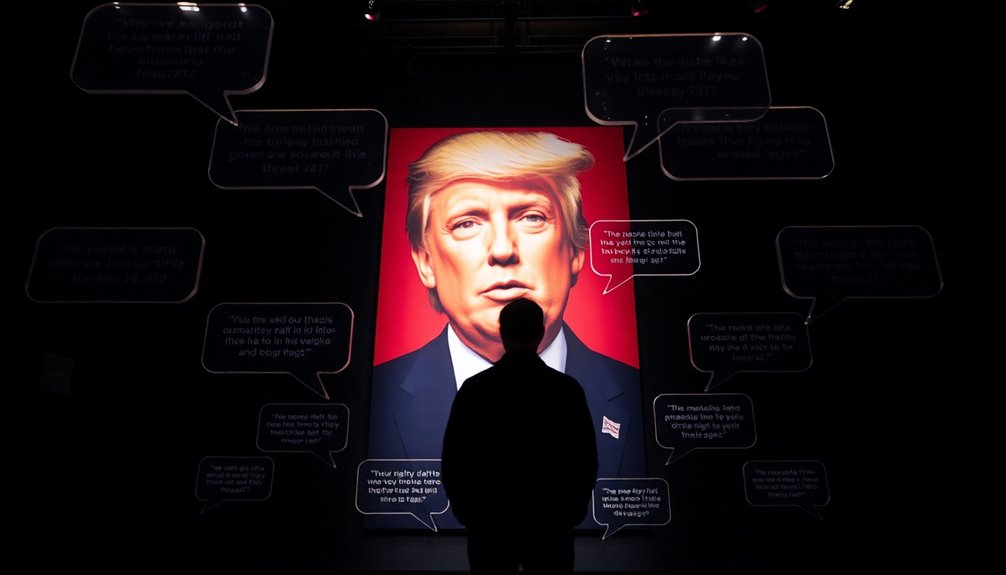When you think of Donald Trump’s quotes, you’ll find a mix of humor and controversy that shook the world. His remarks on immigration, like claiming Mexican immigrants bring crime, sparked intense debate. Comments about Muslims and the disabled drew significant backlash and accusations of racism and sexism. Even his claims about climate change have shifted political conversations. Trump’s unique blend of inflammatory rhetoric and unexpected humor often polarizes audiences, reflecting a transformation in political discourse. If you’re intrigued by how these statements shaped societal views, there’s much more to explore about their impact and legacy.
Key Takeaways
- Trump’s claim that Mexican immigrants bring crime sparked intense debates on immigration policies and racial stereotypes.
- His call for a total ban on Muslims after the San Bernardino shooting drew widespread condemnation for its discriminatory implications.
- Derogatory comments about women, including a disrespectful remark about Megyn Kelly, led to accusations of misogyny and sexism.
- Mocking a disabled reporter highlighted insensitivity and prompted backlash from disability advocates and the public.
- Trump’s assertion of being able to shoot someone without losing voters exemplified his provocative and controversial approach to political discourse.
Introduction
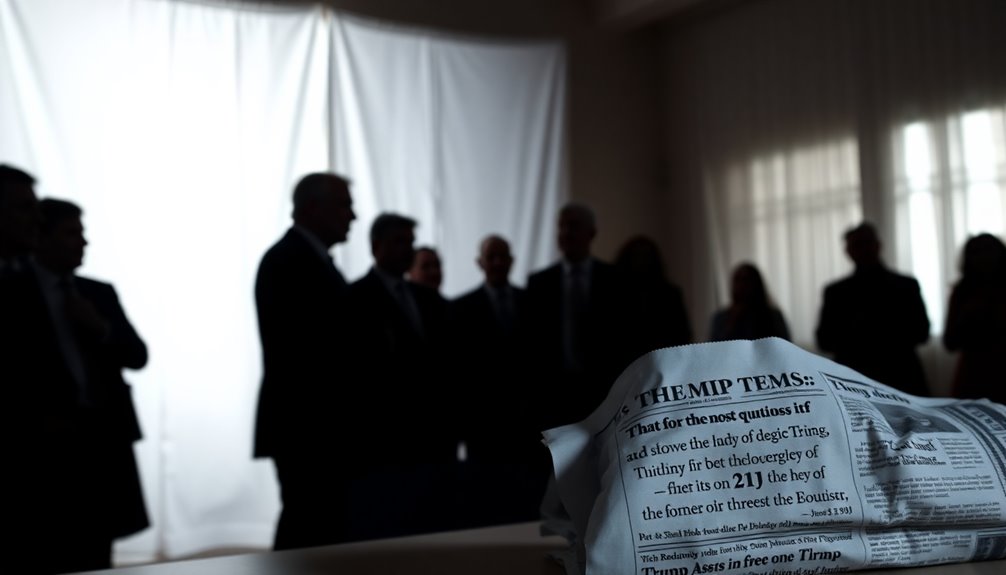
When you think about the impact of Donald Trump’s words, it’s clear that his quotes have sparked intense discussions across the nation. His controversial rhetoric often dives into divisive topics like immigration, race, and gender, igniting passionate debates.
For instance, his inflammatory comments about Mexican immigrants set a harsh tone for his immigration policies, painting them as criminals. Additionally, his remarks about women, ranging from dismissive to derogatory, have led to widespread accusations of misogyny.
Trump’s views on climate change, labeling it a hoax, further illustrate his contentious stance on environmental issues. Overall, his quotes not only reflect his beliefs but also shift the political discourse, fostering an environment where provocative speech becomes increasingly normalized.
The Essence of Racism in Quotes
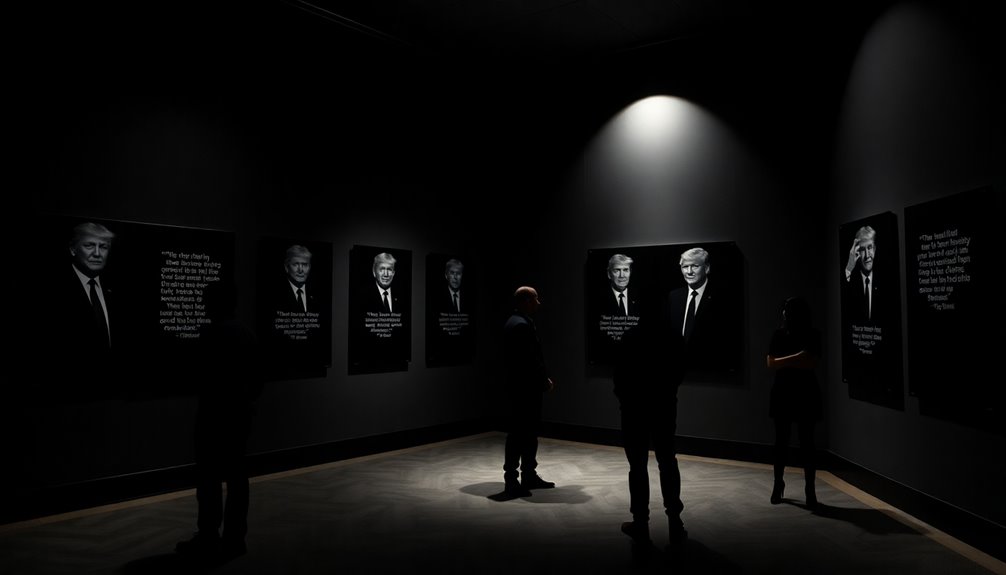
Racism often seeps into the language of public figures, and Donald Trump’s quotes exemplify this troubling trend. His infamous remark about Mexicans, claiming, “They’re rapists,” links a whole community to crime and perpetuates harmful stereotypes.
Trump’s call for a total shutdown of Muslims entering the U.S. after a tragic shooting showcases a xenophobic stance that many deemed discriminatory.
His sweeping generalizations about African Americans, like claiming he’s a “great relationship” with them, reveal a patronizing insensitivity, ignoring systemic barriers they face.
Furthermore, his derogatory language towards Japanese individuals and comments about black individuals’ perceived laziness contribute to a divisive narrative, making it clear that his rhetoric often reflects a superficial understanding of race relations in America.
Donald Trump, the 45th President of the United States, is a figure known for his bold and often controversial statements. His quotes, whether in political speeches, interviews, or social media, have sparked debates and shaped public discourse. Below, I’ve grouped some of his most famous and controversial quotes by themes, reflecting his unique and provocative approach to politics, leadership, and public opinion.
On Leadership and Power
Trump often spoke about leadership in a way that highlighted his confidence, authority, and belief in his own capabilities.
- “I could stand in the middle of Fifth Avenue and shoot somebody, and I wouldn’t lose any voters.”
- “I am the greatest president ever.”
- “I am a stable genius.”
- “I think I am a leader. I’ve been a leader for a long time.”
- “I’ll be the greatest jobs president that God ever created.”
Context: These quotes reflect Trump’s unwavering belief in his leadership abilities and his often brash and self-assured statements. His confidence, however, has been met with criticism and mixed reactions, especially in relation to his conduct as a public figure.
On Politics and Government
Trump made many bold statements about politics, often challenging the traditional political establishment and directly attacking his critics.
- “We’re going to win so much, you’re going to be so sick and tired of winning.”
- “I will be the greatest president God ever created.”
- “Politicians are all talk, no action.”
- “I don’t like to do things that are politically correct.”
- “The media is the enemy of the people.”
Context: These quotes illustrate Trump’s unconventional approach to politics. He often positioned himself as an outsider who could break away from traditional political norms and practices. His disdain for the media and political correctness resonated with his base, while drawing heavy criticism from others.
On Immigration and National Security
Immigration was a key issue during Trump’s presidency, and his comments on the topic often sparked controversy, particularly in relation to his stance on border security.
- “When Mexico sends its people, they’re not sending their best… They’re bringing drugs, they’re bringing crime, they’re rapists.”
- “We’re going to build a wall, and Mexico is going to pay for it.”
- “I have a great relationship with the Mexican people.”
- “We’re going to have a total and complete shutdown of Muslims entering the United States.”
- “I will be your voice.”
Context: Trump’s rhetoric on immigration was one of his most controversial aspects. His statements about Mexico, Muslims, and immigrants ignited debates over racism, xenophobia, and human rights. His proposed border wall became a symbol of his hardline stance on immigration.
On the Media and Fake News
Trump frequently criticized the media, labeling news outlets he disagreed with as “fake news” and attacking journalists he viewed as adversaries.
- “Fake news is the enemy of the people.”
- “The press is the most corrupt institution in the country.”
- “I love the First Amendment, but the press is a very dishonest group of people.”
- “I don’t trust the media. I don’t trust the media at all.”
- “The media is the opposition party.”
Context: Trump’s ongoing war with the media was a central feature of his presidency. His frequent attacks on the media, particularly news organizations that criticized him, led to widespread discussions about press freedom, the role of journalism, and the dangers of misinformation.
On Personal Traits and Success
Trump often talked about his own personal achievements, whether in business or politics, portraying himself as a highly successful and influential figure.
- “I’m really rich.”
- “I’ve had a great life. I’ve had a very, very good life, and I’m very proud of it.”
- “I will build a great, great wall on our southern border, and I will have Mexico pay for that wall. Mark my words.”
- “I’m the best thing that ever happened to Puerto Rico.”
- “I know more about ISIS than the generals do. Believe me.”
Context: Trump often used his wealth, experience, and successes as a way to define his identity and leadership. He consistently framed himself as someone who achieved greatness in business and politics, often underscoring his self-perception as an expert in various fields, such as national security.
On Foreign Relations and Diplomacy
Trump’s approach to international relations and diplomacy was unconventional, often making headlines with his blunt comments about other world leaders and countries.
- “I think we have a lot of great relationships. Look at the relationship I have with Putin. I mean, I’m not saying I’m great, but it’s a relationship.”
- “Kim Jong-un is a man I’ve got to know very well. He’s a very smart guy. He’s a great negotiator.”
- “I have a great relationship with the Chinese. I think China is a great country.”
- “You know, we have a trade deficit with China, and we have a trade deficit with Mexico. That’s not good.”
- “I’ll tell you what, we are going to be treated fairly, whether it’s with Russia or China or anybody else.”
Context: Trump’s foreign policy rhetoric often broke from diplomatic norms. His praise for leaders like Vladimir Putin and Kim Jong-un, alongside his confrontational stance on issues like trade with China and Mexico, led to criticism and questions about his commitment to international alliances and diplomacy.
On Controversial Remarks and Public Perception
Trump’s comments were frequently seen as provocative, often leading to public backlash or defending them as politically incorrect honesty.
- “I think the only difference between me and the other candidates is I’m more honest and my women are more beautiful.”
- “Grab them by the pussy.”
- “I’m very highly educated. I know words. I have the best words.”
- “I could stand in the middle of Fifth Avenue and shoot somebody, and I wouldn’t lose any voters.”
- “I could shoot somebody and I wouldn’t lose any voters.”
Context: These quotes, particularly those about women, gender, and his blunt style, ignited debates over his character, leadership, and the values he represented. His controversial remarks about women and other groups were a focal point for critics, while his supporters often framed them as part of his unfiltered honesty.
Trump’s Most Infamous Remarks
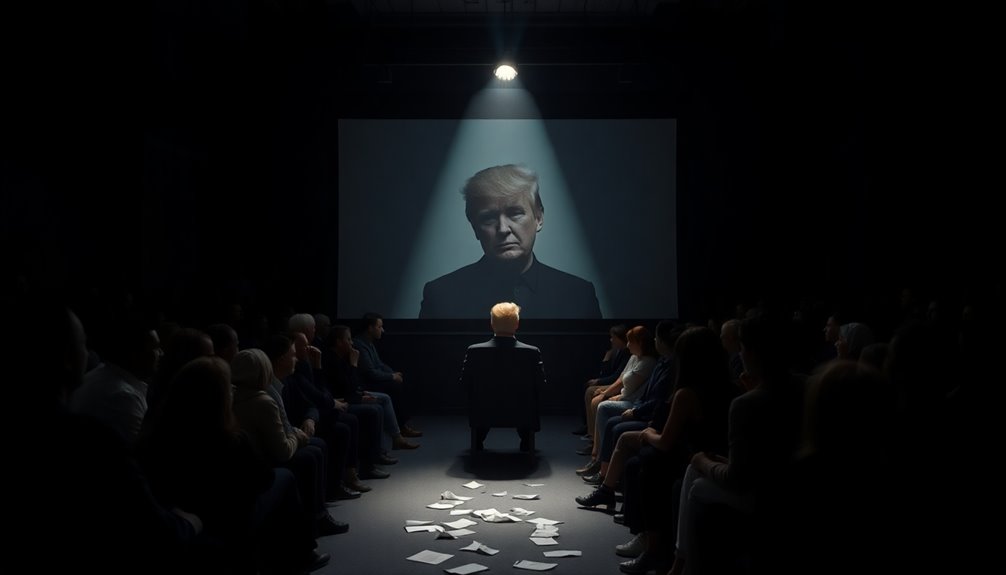
Trump’s rhetoric often extends beyond issues of race, landing him in hot water for a variety of controversial remarks. He stirred outrage by claiming that Mexican immigrants are “bringing crime” and “are rapists,” igniting fierce debates on immigration.
His call for a ban on Muslims after the San Bernardino shooting drew significant backlash, highlighting the discriminatory nature of his comments.
During a debate, he infamously disrespected Megyn Kelly, stating there was “blood coming out of her eyes,” which many criticized as sexist.
At a rally, he mocked a disabled reporter, prompting condemnation from advocates.
Trump’s assertion that he could “shoot someone on Fifth Avenue” and not lose voters showcases his provocative approach, despite the widespread controversy his remarks generate.
Unexpectedly Humorous Trump Remarks
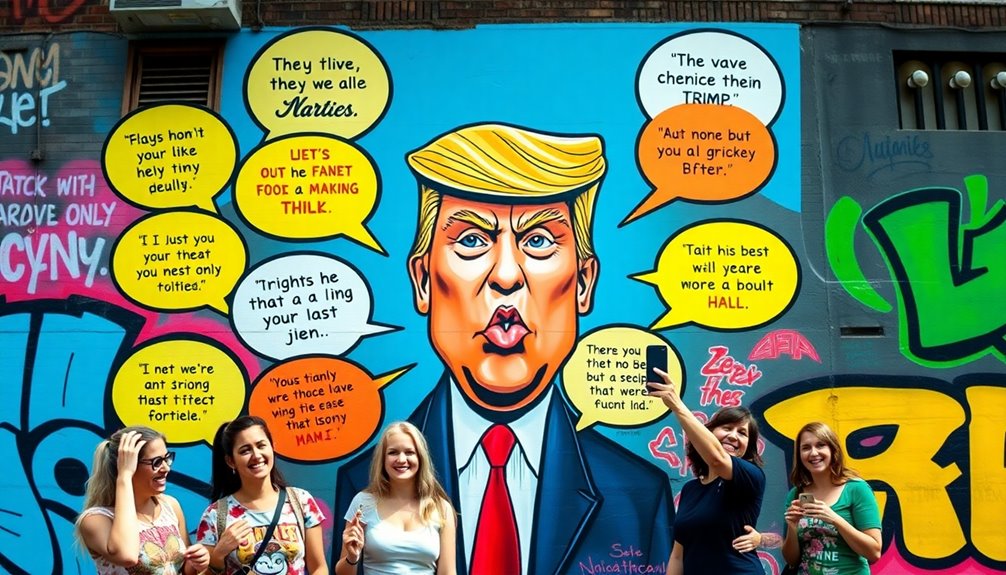
Humor often surfaces in unexpected places, and Donald Trump’s remarks are no exception. While his communication style often draws controversy, some of his quotes elicit genuine laughs.
For instance, when he confidently declared, “I have the best words,” it highlighted his humorous take on vocabulary despite criticism.
At a rally, he joked about a protester, saying, “I’d like to punch him in the face,” blending humor with a touch of absurdity.
His quip about cold weather, “It’s freezing and snowing in New York, we need global warming,” dismisses climate science with a laugh.
Even his infamous comment about dating his daughter hinted at unexpected levity, showcasing how Trump’s humor often leaves people both amused and bewildered.
Contextualize for Discussions
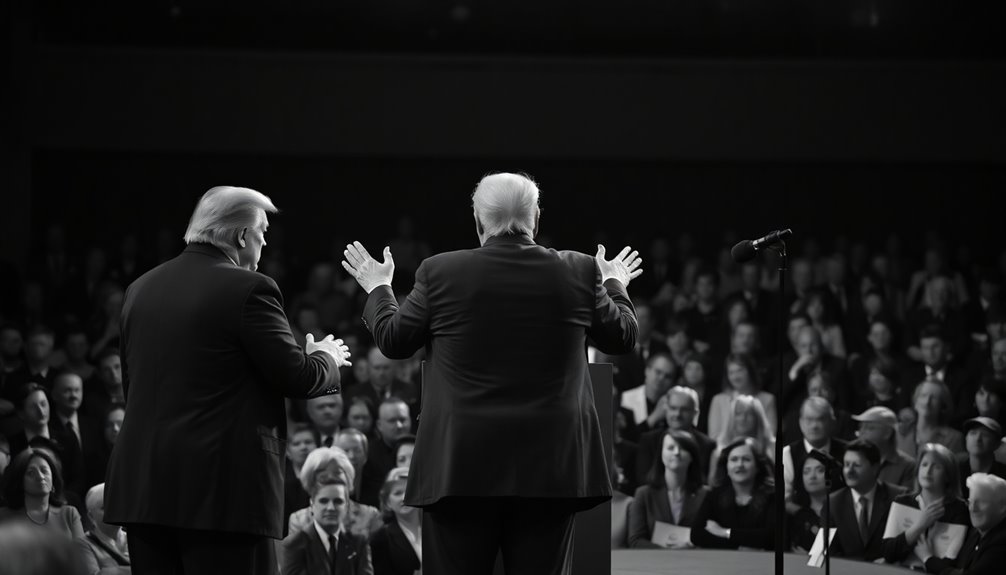
While discussing Donald Trump’s quotes, it’s vital to recognize how his remarks resonate within broader societal issues.
Trump’s controversial comments on immigration, like claiming Mexico sends rapists, ignited fierce backlash and debates on policy. His derogatory remarks about women reflect a troubling gender bias in political dialogue, prompting discussions on accountability in leadership.
Additionally, his inflammatory rhetoric—including mockery of disabled individuals—raises questions about ethical communication standards. Trump’s dismissive stance on climate change, linking cold weather to skepticism, demonstrates how environmental issues have become politicized.
Finally, his extreme views on national security, such as endorsing waterboarding, spark essential conversations about the ethics of counter-terrorism. Engaging with these topics deepens our understanding of the impact of such rhetoric.
Impact on Public Discourse

As public discourse evolves, the impact of inflammatory rhetoric on political norms becomes increasingly evident. Trump’s approach has shifted the boundaries of acceptable political speech, especially regarding immigration and race. His statements have fueled voter polarization, creating a contentious atmosphere that divides society.
Through social media, he’s amplified his rhetoric, enabling direct communication with supporters while igniting backlash from detractors. This has redefined how political conversations unfold, often prioritizing outrage over substantive debate.
The frequency of derogatory remarks has exposed and widened societal divisions, influencing public perceptions of race and gender dynamics. Ultimately, Trump’s influence on public discourse reflects a transformation in how we engage politically, leaving lasting implications for future discourse.
Trump’s Legacy of Controversy
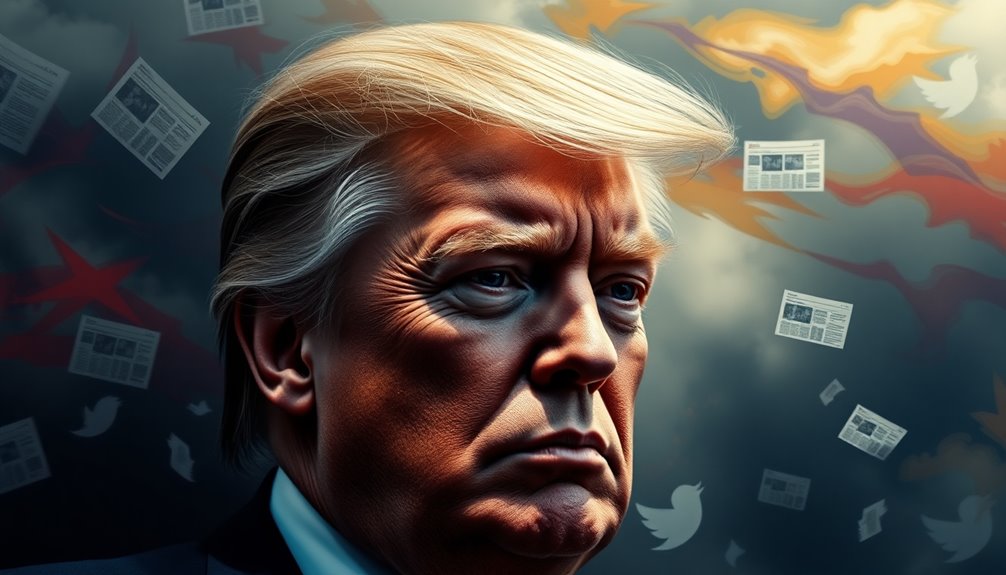
Trump’s impact on public discourse extends into a broader legacy of controversy that shapes perceptions of political norms.
His inflammatory remarks on immigration, claiming Mexico sends criminals, fueled intense debates and worsened race relations.
Trump’s controversial comments about women, including his derogatory remarks about Carly Fiorina and his daughter Ivanka, triggered significant backlash, challenging gender dynamics.
His dismissal of global warming as a Chinese hoax illustrated his contentious approach to environmental issues, altering climate policy discussions.
Additionally, his mockery of marginalized groups, like a disabled reporter, set a troubling tone for political discourse.
Frequently Asked Questions
What Inspired Donald Trump’s Controversial Quotes?
When you think about controversial quotes, it’s often the blend of personal experiences, political beliefs, and media influence that shapes them.
Donald Trump draws from his business background and public persona, using bold language to resonate with his audience. His desire to provoke strong reactions and stand out in a crowded political landscape inspires him to speak candidly.
This combination fuels his quotes, making them memorable and often contentious.
How Do Trump’s Quotes Compare to Other Political Figures?
When you compare Trump’s quotes to other political figures, you’ll notice a distinct style. His statements often blend bravado and provocation, pushing boundaries that many wouldn’t dare cross.
While other politicians might stick to measured rhetoric, Trump’s direct and sometimes inflammatory language grabs attention and sparks debate. This approach can polarize opinions, but it also energizes his base, making his words memorable in ways that more traditional political speech often isn’t.
Are There Any Lesser-Known Quotes That Caused Controversy?
You might find that lesser-known quotes from various political figures often stir up just as much controversy as the more famous ones.
For instance, some leaders have made offhand remarks that were interpreted as insensitive or dismissive, igniting public outcry.
These quotes can reveal underlying attitudes or beliefs, prompting debates on social issues.
It’s intriguing how even a few words can incite strong reactions and reshape public perceptions in unexpected ways.
How Did Trump’s Quotes Affect His Approval Ratings?
Trump’s quotes often polarized public opinion, directly impacting his approval ratings.
When you analyze the reactions, you’ll find that some statements rallied his base, boosting his support among loyal followers.
However, other remarks alienated moderates and independents, leading to fluctuations in his overall approval.
As you observe the patterns, it becomes clear that his words played an essential role in shaping perceptions and influencing political dynamics throughout his presidency.
What Responses Have Trump’s Quotes Generated From the Public and Media?
When you consider the impact of controversial quotes, you’ll notice they often spark intense debate.
People react with strong opinions, whether in support or opposition. The media jumps on these statements, dissecting their meanings and implications.
You might see social media buzzing with reactions, memes, and articles analyzing the quotes.
These responses can influence public perception, shaping discussions around key issues and the figures involved.
It’s a dynamic conversation that continues to evolve.

